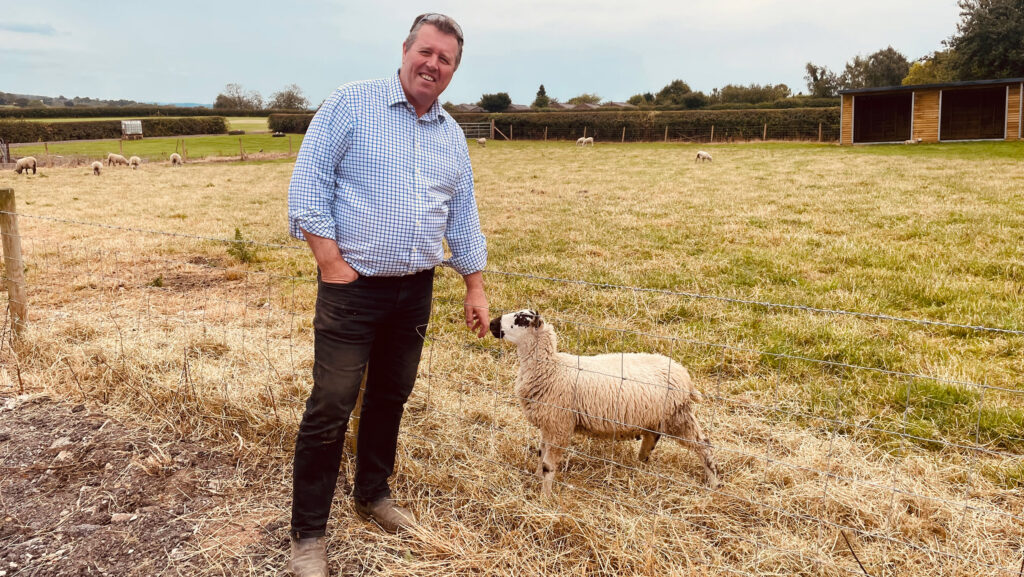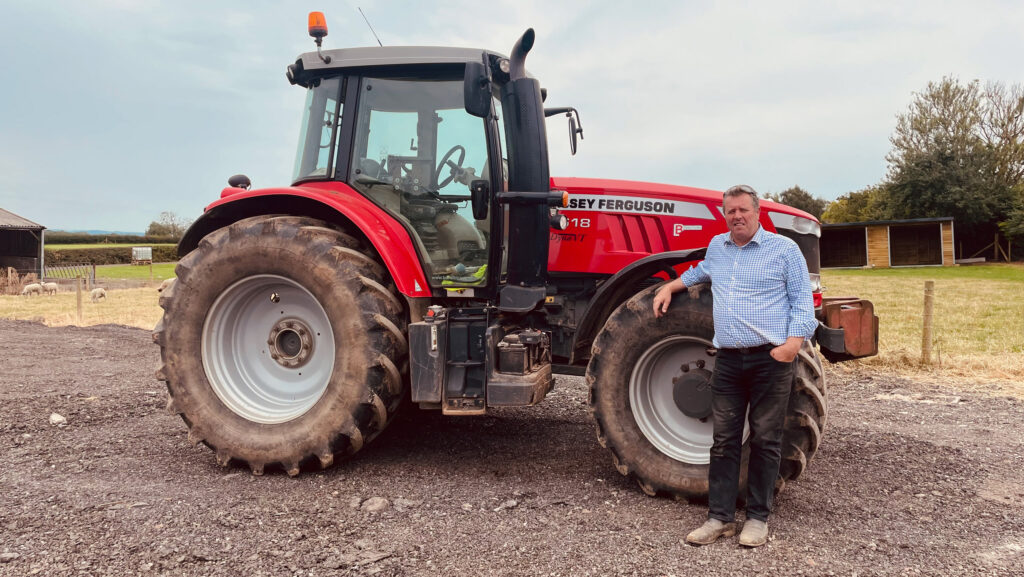Exclusive: Spencer reveals all about his time as farm minister
 © MAG/Abi Kay
© MAG/Abi Kay Former Conservative farming minister Mark Spencer tells Abi Kay what it’s really like to be in the Defra hot seat and how his time as a farmer prepared him for the role.
Many Conservative MPs with agricultural knowledge or links lost their seats at the recent general election, but former farming minister Mark Spencer was one of the biggest scalps.
Speaking exclusively to Farmers Weekly on his farm in Lambley, just outside Nottingham, last week (15 July), Mr Spencer said he had not expected to lose when the then prime minister, Rishi Sunak, announced the date.
See also: Mark Spencer on how YFC shaped him
“We always knew it was going to be tight, and I always knew it came down to how many people voted Reform,” he said.
“I was on Sky News the night before election day and I said: ‘Basically if 5,000 people vote Reform, I’ll win. If 10,000 people vote Reform, I’ll lose.’ And 11,000 people voted Reform, so I lost.”
Though Mr Spencer admitted this experience was “traumatic”, he explained that his previous career in agriculture had helped him to cope.
“Farming teaches you these things,” he said. “You can work day and night trying to get potatoes in and then suddenly get a thunderstorm and it ruins everything you’ve done.
“You can either whinge about that or roll your sleeves up and say, ‘We are where we are, let’s move forward’.”
Silent wins
Having this practical farming knowledge also equipped Mr Spencer in other ways for his ministerial position. In fact, he credits it with helping him gain a series of silent wins behind the scenes.
He refers to these wins – where he rejected “mad” ideas from civil servants – as his greatest achievements in the role.
“When looking at managing farmyard manures, there was a proposal to put a plastic sheet on every muckheap in the country to make sure the rain didn’t run in,” he said.
“It was never definitely going to be what we did, but it was one of the options. I just had to say: ‘We’re not going to do that because it’s clearly been written by someone who’s never had to put a plastic sheet on a muckheap’.
“What happens when it blows off and ends up four fields away, and then you have to go and fetch it and put it back on the muckheap when it’s covered in muck? It was just impractical, it wouldn’t work and we did not do that.”
He also credits his farming background with giving him the knowledge to push back on requests to ban multiple plant protection products.
“Every year we would have a huge discussion around Cruiser SB on sugar beet and Asulox for bracken control, and there are a number of blight sprays which are under pressure,” he said.
“I was able to dig in and say: ‘We need to get this balance right, because if you remove that product from the marketplace, you’re going to wipe out production of that crop in the UK’.
“Pesticides by their very nature are risky if you don’t manage them in the right way, but the farmers I know manage them in the right way. They store them in the right way and apply them in the right way. They’re very expensive products.”
New crop
Mr Spencer expressed concern that the new crop of Defra ministers lack this practical farming experience.
“Without that background knowledge, how do you push back at the very well-meaning civil servant who has a bit of paper in front of them that says this product is very dangerous, or if we don’t do this, this will be the impact on the environment?” he said.
“Not having that background knowledge to be able to say, ‘Actually, in the real world, that’s not how it works’, of course that does worry me.”
He also suggested this lack of experience could mean ministers are unable to spot potential problems on the horizon, such as a straw shortage this autumn, and warned this could leave them more reliant on lobby groups of all persuasions.
“That’s not a healthy thing, because they’ve all got their vested interests, whether that’s the CLA [Country Land and Business Association], NFU or Greenpeace and Friends of the Earth,” he said.
“You do need to have that bit of knowledge yourself to be able to say, ‘Actually guys, you’re exaggerating that a bit’. We would have that with the NFU where they would come and say livestock farmers are under huge pressure, and I’d say: ‘If that’s true, why are store cattle at the highest price I’ve ever seen in my lifetime?’
“Without that background knowledge, you could be misled or misinformed.”
Despite this, Mr Spencer did vigorously defend one of the most recent Defra secretaries he served under – Therese Coffey – who had no farming experience, but who he described as “pretty good.”
Ms Coffey came under fire after a particularly difficult appearance at the NFU Conference in 2023.
He said: “I think she got quite a rough ride, to be honest. I saw her close-up and she was very robust. She really did dig in and fight for the sector behind closed doors.
“Maybe she didn’t project that very well publicly, because then she got quite a bad reputation. She got that bad reputation because she could be quite a prickly character.
“But actually, that was quite a weapon when dealing with people who were trying to make you do things that you didn’t want to do.”
An ability to say “no” to people, as well as being amicable, is a key skill any politician needs, according to Mr Spencer, and that’s the case when dealing with other government departments, as well as external contacts.
He described the Treasury and the Department for International Trade (DIT) as the most “tricky” to deal with, noting a battle on funding for Expo 2025, a trade show being held in Osaka, Japan, as being particularly difficult.

© MAG/Abi Kay
Mr Spencer explained that DIT had written to a number of departments, including Defra, asking them to find £8m for a pavilion to promote British food at the event. He believed this should be funded from the trade budget.
“I said: ‘No, we’re not doing that’. So we got into quite a ding dong over who was paying what, with the chief secretary to the Treasury trying to referee.
“The figures were eye-watering. I remember saying to the minister at the time that I could take out a front page ad on every Japanese newspaper for a whole year for that budget.”
Eventually, the numbers came down to a more “realistic” level, with the cost split between DIT, the Department for Education and Defra.
Though Mr Spencer says he was similarly “robust” in meetings on other matters, there were three areas in particular where he felt the government could have gone further – supply chain fairness, providing more support to small abattoirs, and gene editing.
On the latter, he felt particularly constrained by having to go at a pace the public felt comfortable with.
He said: “You never want to be Edwina Currie [the Conservative minister who was forced to resign after saying British eggs were contaminated with salmonella], creating a moment where you destroy the industry accidentally by making some comment or assertion that destroys consumer confidence.”
He does not, however, describe wanting to do more on these issues as “regrets”.
“Honestly, I can sleep in my bed at night because I know I genuinely tried my best,” he said. “I don’t think I could have tried or worked any harder than I did.”
His one true regret – besides not becoming secretary of state – was “not getting the job sooner”.
He believes this would have allowed him to look at Defra’s relationship with its arm’s-length bodies, and bring Natural England (NE), in particular, “back in house”, making it “more accountable”.
Natural England
NE’s decision to designate 3,044ha in West Penwith, Cornwall, as a site of special scientific interest (SSSI) was a specific frustration for Mr Spencer, who had “zero ability” to influence the plans.
“I personally think politicians are paid to make decisions and they should live or die by those decisions,” he said.
He has warmer words for the performance of the Rural Payments Agency (RPA) and the Environment Agency (EA), which he claims has “improved its approach” towards farmers.
He also strenuously defended the record of the Animal and Plant Health Agency (Apha) on disease preparedness, noting “a lot of time” had been spent trying to mitigate avian influenza and plan for a bluetongue outbreak.
“It’s very easy to say you’re not prepared,” he said. “But people always view these things through the prism of hindsight. All you can do as a government is try and prepare for those things, but without tying yourself in knots.
“Because actually, I want those people out on farm dealing with TB and AI and bluetongue, not sat in a scenario room, dreaming about things that might never happen.”
Future
Another issue Mr Spencer puts firmly in the camp of “things that might never happen” is him standing again for parliament – saying two weeks into a five-year Labour government is too soon to make the decision.
“We’ve got a diversification project [of a new coffee shop] ongoing, which we’re just starting. We’ve got a family wedding coming up. So short-term, I’m going to concentrate on that,” he said.
“Long term, I’d love to find new roles and ways to influence the sector. I’ve got a vested interest in that. I want my kids to be successful in farming and if I’m ever blessed with grandchildren, I want them to be successful in this sector. So of course I’ll always care about it.”
